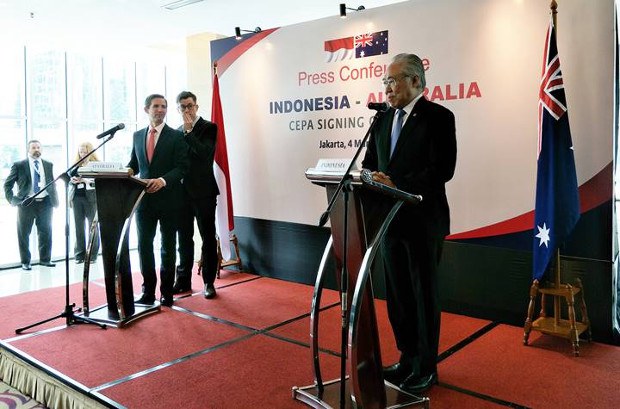Indonesia Signs Landmark Free Trade Deal with Australia
2019.03.04
Jakarta
 Indonesian Trade Minister Enggartiasto Lukita (right) and Australian Minister for Trade, Tourism and Investment Simon Birmingham appear at a press conference in Jakarta after signing a free trade agreement, March 4, 2019.
Indonesian Trade Minister Enggartiasto Lukita (right) and Australian Minister for Trade, Tourism and Investment Simon Birmingham appear at a press conference in Jakarta after signing a free trade agreement, March 4, 2019.
Indonesian and Australian officials signed a much-awaited free trade agreement on Monday, paving the way for the elimination of most tariffs and closer economic ties between the two neighbors.
Indonesian Trade Minister Enggartiasto Lukita signed the trade deal with Australian counterpart Simon Birmingham in Jakarta, ending nearly a decade of negotiations.
Under the agreement, all Indonesian goods will enjoy zero tariffs when entering Australia, while duties on 94 percent of Australian goods imported by Indonesia will be eliminated gradually.
Enggartiasto described the deal, formally called the Comprehensive Economic Partnership Agreement, as historic.
“This agreement is very beneficial for the two countries and is comprehensive, not only in terms of trade in goods but also investment and services,” he told reporters after the signing ceremony.
“Trade between the two countries has been too small, so we hope that it will increase with this agreement,” he said.
It is subject to ratification by both countries’ parliaments.
Birmingham said the deal would take ties between Indonesia and Australia to a new level, “one in which our economic and trade relations will be much deeper, stronger and richer.”
“There’s more business opportunity in Australia, but also more business opportunity in Indonesia as a result of that shared collaboration and the joint productive value that comes from making things together,” he said.
The Indonesian government said industrial sectors such as automotive, textile, footwear and agribusiness would benefit from the trade agreement.
In return, Indonesia will grant automatic import permits for Australian agricultural products and meat.
The deal will allow Australian universities to operate in Indonesia and Australian companies to have greater stakes in sectors such tourism, health and mining.
Australia also will increase the number of work and holiday visas given to Indonesians from 1,000 to 4,100 in the first year, before growing to 5,000 annually six years after ratification.
Indonesia and Australia are members of the G-20 group of major economies, but are not each other’s top 10 trading partners, despite their proximity.
Total bilateral trade between Indonesia and Australia was valued at U.S. $8.6 billion in 2018, according to the Indonesian Trade Ministry.
But goods from Indonesia make up only 1.2 percent of Australian total imports from around the world, while Australian goods account for 3.4 percent of Indonesia’s imports, Enggartiasto said.
Negotiations for the pact, which started in 2010, concluded in August, but the signing was delayed after Australian Prime Minister Scott Morrison said Canberra was considering moving its embassy in Israel from Tel Aviv to Jerusalem.
Indonesia, the country with the world’s largest Muslim population, is a staunch supporter of the Palestinians and has warned that such a move could undermine efforts for a two-state solution.
In December, Australia formally recognized West Jerusalem as Israel’s capital, but stopped short of moving its embassy.
The chairman of the Indonesian Chamber of Commerce and Industry (Kadin), Rosan Roeslani, said Australian investment in education and health could improve Indonesia’s competitiveness.
“With the huge trade potential of two countries, it is very important for Indonesia to immediately carry out the economic reform process needed as part of its [free trade] commitments,” Rosan said.
Relations between Indonesia and Australia are often testy, but bilateral ties improved under former Prime Minister Malcolm Turnbull, with the two nations agreeing to restore full military cooperation in 2017.
The two nations in the past years have been embroiled in spats over issues such as Australia’s perceived interference in East Timor, a former Portuguese colony occupied for more than a decade by Indonesia but which voted for independence in 1998.
A diplomatic rift also took place in 2013 after reports surfaced that Australian intelligence services had spied on then-Indonesian President Susilo Bambang Yudhoyono and his inner circle.
Australia briefly recalled its ambassador to Jakarta after Indonesia executed two Australian drug convicts in April 2015, despite pleas from Canberra to spare their lives.







